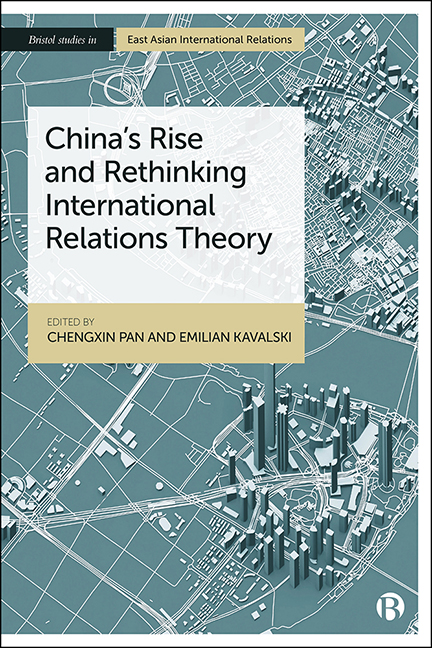Book contents
- Frontmatter
- Contents
- List of Abbreviations
- Notes on Contributors
- Acknowledgements
- Introduction: The Rise of China and Its Challenges to International Relations Theory
- PART I Theorizing China’s Rise: Beyond Eurocentric Knowledge Production
- PART II Theorizing China’s Rise: Critical Reflection on Mainstream Frameworks
- Epilogue: Towards International Relations beyond Binaries
- Index
7 - China’s Rise in English School Perspective
Published online by Cambridge University Press: 15 September 2022
- Frontmatter
- Contents
- List of Abbreviations
- Notes on Contributors
- Acknowledgements
- Introduction: The Rise of China and Its Challenges to International Relations Theory
- PART I Theorizing China’s Rise: Beyond Eurocentric Knowledge Production
- PART II Theorizing China’s Rise: Critical Reflection on Mainstream Frameworks
- Epilogue: Towards International Relations beyond Binaries
- Index
Summary
Introduction
The idea behind this chapter is that the English School (ES) provides a distinctive perspective on China's rise, and offers particular insights into the question of whether and how China is a status quo or revisionist power. The ES's main concern is to differentiate international society (a social structure) from international system (a material structure), and to focus on the former. Its principal analytical tool is the concept of primary institutions, understood as deep, evolved practices shared among states (and other political actors) and defining the criteria for both membership of, and legitimate behaviour within, the society of states (Buzan, 2018; forthcoming). Primary institutions include sovereignty, diplomacy, international law, territoriality, nationalism and several more, and are contrasted with the secondary institutions (instrumental, designed regimes and intergovernmental organizations) studied by liberal institutionalists. Primary institutions constitute the normative framing of international society and can be studied either normatively or structurally or both. States are thus embedded in an international society of their own making, and the degree of order within that society can vary across a spectrum from a thin pluralist logic of coexistence (for example 18thcentury Europe) to a thick solidarist logic based on shared values and institutionalized cooperation (for example the European Union). Unlike secondary institutions, which only appeared in the late 19th century, primary ones date back to the beginnings of civilization. In this chapter I will use primary institutions as the principal lens through which to examine the rise of China (Bull, 1977; Buzan, 2004: 161– 204; 2014a; Holsti, 2004; Hurrell, 2007; Schouenborg, 2011).
The ES is thus in one sense a historical approach, interested in comparative and evolutionary international society. But given its unique set of concepts, it is also a theoretical approach (Navari, 2009). The main claim of the ES to theoretical status is that it sets out a distinctive picture of what the international system/society looks like, and a novel taxonomy of what it is that international relations (IR) should be taking as its principal objects of study.
- Type
- Chapter
- Information
- China’s Rise and Rethinking International Relations Theory , pp. 145 - 167Publisher: Bristol University PressPrint publication year: 2022

